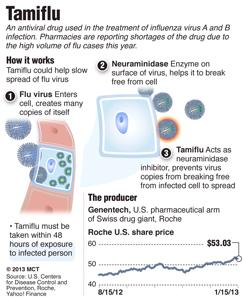Tamiflu shortage leaves some students feeling queasy
January 24, 2013
Senior rehab science major Amanda Nguyen managed to make it to Student Health last Monday despite a nasty case of the flu.
After a weekend of feverish bedrest, she was ready for some sort of relief.
“On Saturday night my body just began to ache,” she said.
A doctor at Student Health prescribed Tamiflu, an antiviral medication for relief of flu symptoms, to Nguyen, but upon arriving at the Student Health Pharmacy she found there was no more left. Staff there referred Nguyen to CVS, but the store was also out of Tamiflu.
“I just had a lot of rest and orange juice,” Nguyen said. “I took over-the-counter medicine.”
In the midst of a particularly nasty flu season, health providers across the country are experiencing a shortage of Tamiflu, and Pitt’s Student Health Center is no exception.
Last Friday, Pitt Student Health only received four doses of Tamiflu, an antiviral medication used to prevent and treat influenza.
“There are sporadic shortages being seen throughout the country,” Director of Student Health Services Marian Vanek said in an email. “Our distributors are being very careful with allotments. For example, we ordered 10 doses but only received 4 doses.”
So far this season, Student Health diagnosed approximately 78 cases of influenza-like illnesses.
“Note,” Vanek said in her email, “that we do not test for influenza, and therefore do not have supporting data, and make the diagnosis based on a patient’s history and physical examination.”
But, Vanek said, not all students experiencing flu-like symptoms need Tamiflu. The medication only works within 48 hours of infection and often infections aren’t severe enough that treatment is vital.
Nguyen, for one, is feeling a lot better and only missed Monday and Tuesday morning classes without Tamiflu.
Junior anthropology major Travis Fink said he decided to stay home at his apartment on Ward Street and to not visit the Student Health Center or take antibiotics.
“I was out for four days,” Fink said.
But in some situations, Tamiflu can prevent a severe escalation in illness.
“[Antiviral medication] can prevent serious flu complications, for example, pneumonia. For people with a high-risk medical condition, treatment with an antiviral drug can mean the difference between having a milder illness versus a very serious illness,” Vanek said.
Still, students can try and avoid this worst-case scenario completely by getting a flu shot. Luckily, Student Health is still well-stocked on flu vaccinations and eager for more students to get vaccinated.
“To date, [Student Health has] given close to 2,700 flu shots. We still have vaccine available and students are still able to take advantage of this offer,” Vanek said.
Regionally, influenza and influenza-like illness are hitting Allegheny County hard.
According to the most recent numbers from the Pennsylvania Department of Health, Allegheny County has 1,249 reported cases of influenza-like illness. Surrounding counties closest to Allegheny’s high were Butler and Westmoreland with 504 and 700, respectively.
With so much flu activity, it’s been hard to keep medication well-stocked. Students might not be able to rely on Tamiflu to get them through this flu season.
“We aren’t sure when the next delivery will occur,” Vanek said.
Yet Vanked noted that students experiencing serious signs of illness should still visit a doctor.
She pointed to difficulty breathing or shortness of breath, pain or pressure in the chest or abdomen, sudden dizziness, confusion, severe or persistent vomiting and flu-like symptoms that seem to improve but then return with fever and a worse cough as signs that a person might be in need of immediate medical attention.







